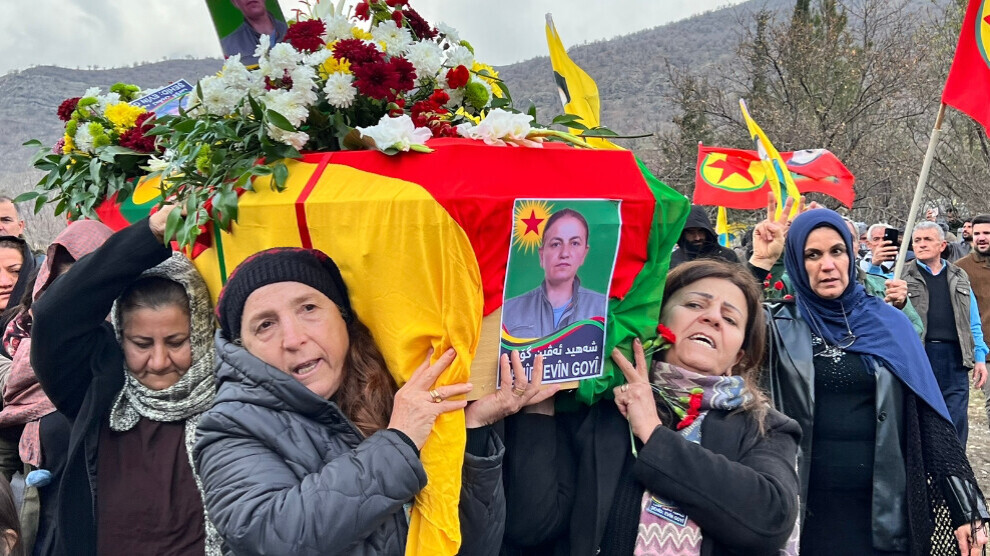Paris martyr Evîn Goyî laid to rest in Qandil
The body of the Kurdish revolutionary Evîn Goyî, who was murdered in Paris, was transferred to Sulaymaniyah in Southern Kurdistan earlier today and buried at the Cemetery of Martyrs in Qandil.
The body of the Kurdish revolutionary Evîn Goyî, who was murdered in Paris, was transferred to Sulaymaniyah in Southern Kurdistan earlier today and buried at the Cemetery of Martyrs in Qandil.

Evîn Goyî (Emine Kara), Mîr Perwer (Mehmet Şirin Aydın) and Abdurrahman Kızıl were shot dead in an armed attack on the Ahmet Kaya Cultural Centre in Paris on 23 December. A large funeral service was held in Paris on Tuesday, and the martyrs were sent off to their hometowns in Kurdistan for burial; Mîr Perwer in Muş, Abdurrahman Kızıl in Kars and Evîn Goyî in Qandil.
The body of Evîn Goyî was transferred to Southern Kurdistan (Northern Iraq) and brought from the airport in Sulaymaniyah to the Ehmed Heci Eli Mosque. From there, the body was sent for burial at the Mehmet Karasungur Cemetery of Martyrs in Qandil region where her family lives.
Evîn Goyî's aunt Medine Kara gave a speech at the ceremony in Sulaymaniyah in which she thanked those present for their great sympathy and said: "Evîn has fallen for all four parts of Kurdistan. May she be the last martyr of Kurdistan. I offer my condolences to all Kurds and hope that there will be no more bloodshed." The murder of Evîn Goyî will usher in the defeat of the enemies of the Kurdish people, Medine Kara continued, adding that sixty of her relatives had fallen in the Kurdish liberation struggle.
The ceremony at the cemetery of martyrs was attended by hundreds of people who displayed the PKK flag and images of the PKK leader Abdullah Öcalan.
The coffin of Evîn Goyî was covered with a PKK flag and carried by women on their shoulders.
The Kurdish revolutionary was laid to rest under the slogans “Şehîd namirin” [Martyrs are immortal] and “Jin, Jiyan, Azadî” [Woman, Life, Freedom], with the crowd promising commitment to their martyrs.
Evîn Goyî was born in the village of Hilal in the Botan region of Northern Kurdistan and joined the PKK in 1988 at the age of 14. She was a member of the Executive Council of the KCK (Kurdistan Communities Union), fought as a YPJ commander in Rojava against the "Islamic State" (IS) and was a leader of the Kurdish women's movement until her assassination.